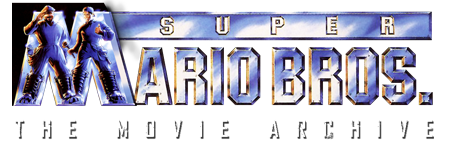About the Super Mario Bros. Movie
History of Hollywood and Game Adaptations
Pre-Production of Super Mario Bros.
Production Issues on Super Mario Bros.
-INTRODUCTION-
Everyone knows about Super Mario Bros., don't they? At one point in time, kids were more familiar with Mario than Mickey Mouse. So, when something’s really popular, you make a movie about it, right? Well, that’s exactly what happened. Super Mario Bros. was released on May 28, 1993 by Hollywood Pictures (now Walt Disney Pictures). It starred Bob Hoskins and John Leguizamo as the titular Mario and Luigi—the Mario Brothers. Hollywood's original "bad boy" Dennis Hopper starred as the sinister King Koopa, and Samantha Mathis portrayed Princess Daisy.
The film attempted to provide a legitimate backstory for the Mario Brothers' first adventure, becoming the "Super" Mario Bros. by the film's end. The filmmakers researched what little they had available to them at the time—the major Mario games released by filming in 1992 were Super Mario Bros. 1, 2, 3, and Super Mario World. Although a "fantasy based" film--inspired more literally by the games--had made its way through pre-production, the producers lost faith in that approach and instead turned to Rocky Morton and Annabel Jankel (the creators of Max Headroom) to direct, allowing them to develop their own take on the Super Mario Bros. from the ground up.
For some, the end result was an interesting, unusual, entertaining, compelling, and inspired look into this fantastical world. Others have had a hard time accepting the way the 8 and 16-bit games were adapted onto celluloid, calling the movie a complete disaster and disgrace to the video games. The goal of this website is to help its visitors better understand an often misunderstood film. What the filmmakers were trying to do with this movie had never been done before, so we think it's important to appreciate the immense amount of thought and respect that went into creating the final product. In the end, the filmmakers did something wildly revolutionary—by making the first ever theatrical feature based on a video game property.
-Ryan Hoss, Webmaster
-HISTORY OF HOLLYWOOD AND GAME ADAPTIONS-
Video Games and Hollywood are two industries that have a shaky history together, and yet as video games become more popular, they are more likely to meet on a regular basis. Recent developments have seen Hollywood Studios hired to make emotive trailers for upcoming action games. In the case of the game 'Dead Island' the quality of the trailer showed up the lack of quality in the game's own writing, with Halo 3 employing the same technique to more positive rapture. However Hollywood grabbing onto hot video game properties (Or creating some of their own) goes back as far as the late 1970s.
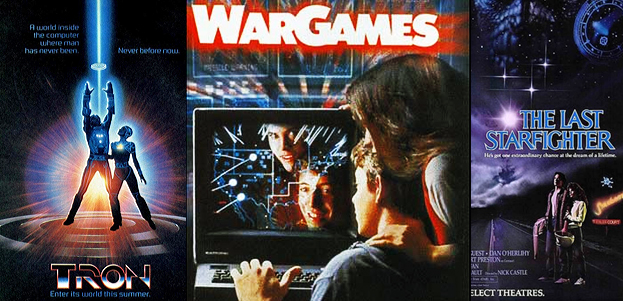
Super Mario Bros is not the first movie based on video gaming, but it is the first based on a specific popular brand. Prior to Super Mario Bros, the video game movies were in the guise of original science fiction ideas. Tron (1982) was one of the first and most prominent movies to utilise video gaming as a major plot arc. It used (at the time) top of the range CGI special effects and was Disney's first foray into video game adaptions, and while not based on an existing video game, several game adaptions were made on multiple consoles.
WarGames (1983) was the next popular movie to try and translate video games over, this time a young boy plays a very basic early 1980's style video game which just so happens to be, unknown to the boy, controlling actual warheads and building a possible war between Russia and America. The Last Starfighter (1984) was one of the last popular films on video gaming during the 1980s and achieved only light success compared to the movies before it, partly due to the video game crash of 1983 having fully taken effect (which wouldn't recover until Nintendo revitalised the market in 1985/86). It did, however, have the privilege of being the first movie to do space-based special effects using only CGI which required them to make new graphical programs in order to accomplish a cinematic look, and almost had a real "Last Starfighter" video game made for it by Atari - however this video game was eventually cancelled.
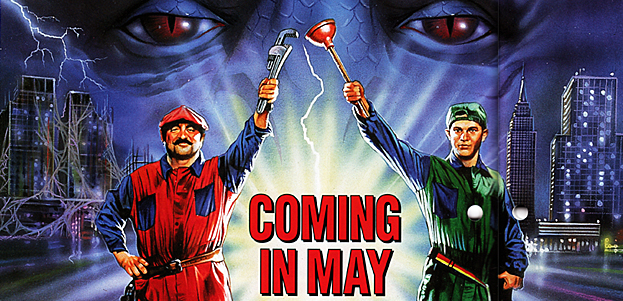
When it came to the next time video games were to be converted by Hollywood for a major production, it made sense to utilise Disney as they had kick-started the trend back in 1982 and Super Mario Bros for reviving the dying video game media format almost single-handedly. Anytime anyone should ask "Why did they think a movie based on Super Mario was a good idea?", then the reasons seemed obvious at the time. It was a franchise which had saved video gaming, by a studio which had revolutionised CGI in film-making and with the right production team behind it - How could it possibly go wrong?
-PRE-PRODUCTION OF SUPER MARIO BROS.-
While we have an entire section of Pre-Production information for you to peruse in detail, I just want to lightly hit on several things that shaped the production of the movie in terms of its style and direction. First of all, it began with a script idea that was much more faithful to the original video games. Cartoonish in nature, it was a mixture of then-director Greg Beeman leaving the project and Shigeru Miyamoto (The creator of Super Mario, Legend of Zelda, Pikmin and many others) preferring the movie create its own world that pushed the project to find a new way of translating to the big screen. For whatever reason the direct cartoonish script was not attracting directors to the project, and so a more interesting concept had to be made.
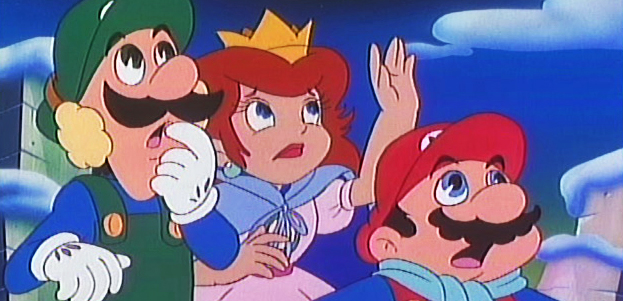
The script would go through many various iterations. Firstly the Dinohattan concept was grafted onto the fantasy storyline to give the script a more realistic edge, but keeping the more fantastical elements of the story (Such as Mario and Luigi being characters in prophecy). It was then rewritten again into a more sci-fi edge, but this time with lots more added comedy inspired by the success of Ghostbusters. This script was also filled with more, and story-related, references to the games which the final film only really included as background detail. It then moved on to a new writer, who took inspiration from Die Hard (Including a cameo of Bruce Willis in a Koopa Tower air duct), moving away from comedy, bar some satire, and delving into a darker adult-oriented adventure.
The script was rewritten many times, however the script put forward in March 1992 was the one that got everyone's attention. It was a Mad Max style plot, with a script far more refined, sophisticated and adult-oriented than any of the previous scripts had dared to be. While not so related to the games (Which is what Shigeru Miyamoto wanted) it did encorporate a more refined British political satire and showed the reptilian population as more hedonistic. This was a very self-aware script with political and social depth and brought Dennis Hopper, Bob Hoskins and Fiona Shaw to the project. For those wondering "How did they get such big names in this movie?", that is where they came on board. A Disney production of a revolutionary game translation with deep political and social undertones. It was a shame that the majority of these elements would go through so many changes during production and get left out - a fact which angered many of the primary cast.
-PRODUCTION ISSUES ON SUPER MARIO BROS.-
With a strong script, strong cast and strong company heritage in the field of CGI and video games based movie making, Super Mario Bros. was a surefire winner. All it required was a crack team of production crew and success was in the bag. This was assured by several legendary artists in the movie making industry with more-than impressive resumes. First off was production designer David L. Snyder - known for his work as art director for Ridley Scott's now-legendary film, Blade Runner.
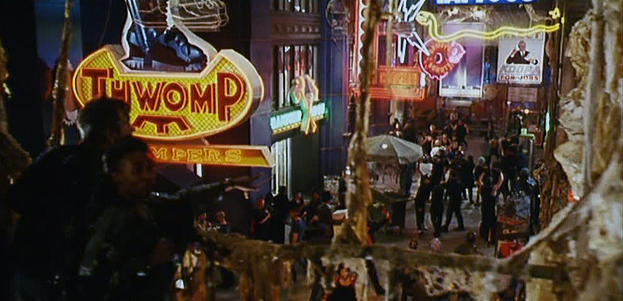
Snyder seemed to be the one of the only people in the end who focussed heavily on game references, building the entire city of Dinohattan inside a disused cement factory complete with Hammer Bros Tattoos, the Boom Boom Bar, Wiggler beer etc. In fact his city designs ensured a striking sci-fi look that matched the dark and adult-themed stylings of the original script. There was also Alan Silvestri composing the music, most famous for his soundtrack to the epic Back To The Future trilogy, giving the film a massive boost in professional quality. If it was thought that Super Mario Bros would be a surefire flop, you wouldn't get artists of this calibre working on the movie.
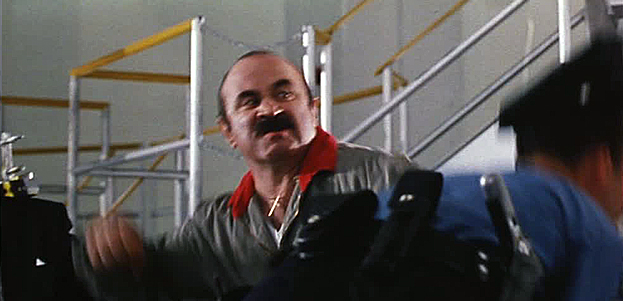
Despite the seemingly perfect blend of professional artists, Super Mario Bros was marred by huge problems during the production phase. Firstly all of the cast have unanimously stated that the directing duo (Rocky Morton and Annabel Jankel) were horrendous to work for, with Dennis Hopper stating they were "...control freaks and wouldn't talk before they made decisions.", and Bob Hoskins being much more aggressive and stating that the director's "...arrogance had been mistaken for talent.". Indeed, after only a few weeks they were removed from the set and the production and direction was handed over to somebody else. This was due to the director's wanting to make a darker, hard edged movie and Disney wanting to develop a more family-friendly film - with daily script rewrites making the movie fall short of them both instead. Under these conditions, the seemingly "perfect" translation with all of it's highly acclaimed and celebrated parts, started to crumble.
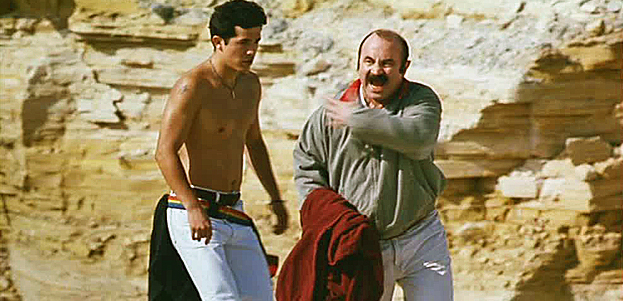
The movie required an extensive amount of ADR (Audio dubbing usually used to correct/rephrase parts, due to mis-spoken or hard-to-hear audio issues) just to patch holes in the new and completely mish-mashed storyline. There were a lot of cuts, usually to filmed sequences deemed too 'dark' for a family friendly movie. These are all intriguing aspects to this movie that we would like to see more of (And there are more in-depth details as we find them in our Pre-Production and Post-Production sections on this site). There was the complete devolution (To "death" as green slime) of a Koopa employee after Toad's transformation, the filmed sequence of Koopa chasing Daisy's mother through Brooklyn (Which we only have a short clip of from a trailer), the Scapelli goons who were filmed but never seen in the end movie and most importantly there was a deeper emotional through-line to the entire movie of Luigi doubting his 'family pride' and Mario resenting his brother for getting him into Dinohattan in the first place. Such sequences are missing, and would likely add a bit of weight to the film which harsh cutting left out.
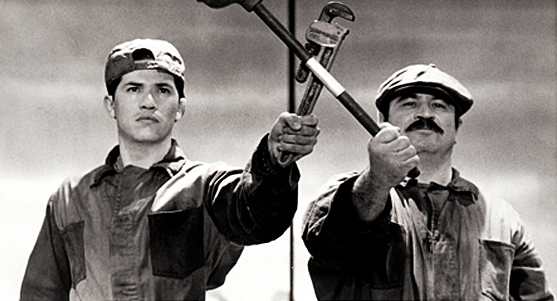
Upon its release, film recieved a whirlwind of positive reviews from many countries around the world. In America, The Washington Post, Sixty Second Preview and Los Angeles Times all raved about the movie. In the UK the Daily Mirror and Daily Mail (Newspapers) both gave highly praising reviews (The Daily Mail calling it "Hilarious & Exciting - A cross between Indiana Jones, Blade Runner & Star Wars"). The Swedish Njutafilms release also includes the Expressen's review, loosely translated it says "Superb! This grand adventure bounces unabashedly forward without rhyme or reason."
Despite the film's current status, these are not negative reviews. However it only made less than half its budget back, and this was likely due to being released at the same time as Jurassic Park which had similar dinosaur themes but a bigger name behind it. At the time, nobody could compete with Steven Spielberg. The failure of this movie was less likely to be related to the movie quality than a simple case of bad release date. Fans and movie-goers had no reason to think anything negative of the movie, the reviews were mostly positive, but a choice between dinosaurs in Super Mario Bros or dinosaurs in Jurassic Park by Steven Spielberg? The money spoke, and a false fact about the Super Mario Bros' failure being down to the film's quality was set into folklore.
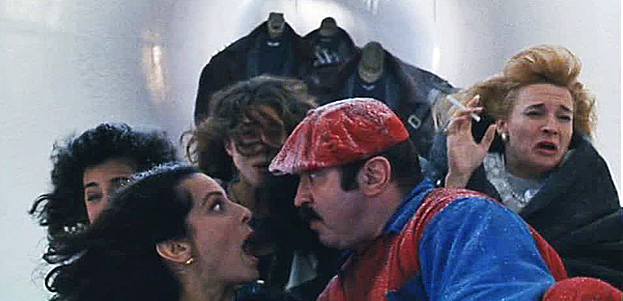
Fan reaction was quite different, however. Despite many of the fans not having gone to see the movie on it's release, the few that did were expecting a rather faithful adaption of the source material. What they wound up with was a mish-mashed sci-fi/comedy adventure which was somewhat confused about it wanted to be. For this reason, fans panned the movie outright without actually looking into the movie itself. Given a short, once-over look (Much like thumbing through the pictures in a book without caring too much for text) the Super Mario fans felt that this was a betrayal of what they had paid good hard-earned cash to see. How often the question is raised "Why didn't they make it more like the games?", and the reply has already been mentioned here. No director would sign up, and Shigeru Miyamoto who makes the games said he wanted it to be it's own unique entity - he even commented on the film's commercial failure:
"The one thing that I still have some regrets about is that the movie may have tried to get a little too close to what the Mario Bros. videogames were. And in that sense, it became a movie that was about a videogame, rather than being an entertaining movie in and of itself." -- Shigeru Miyamoto
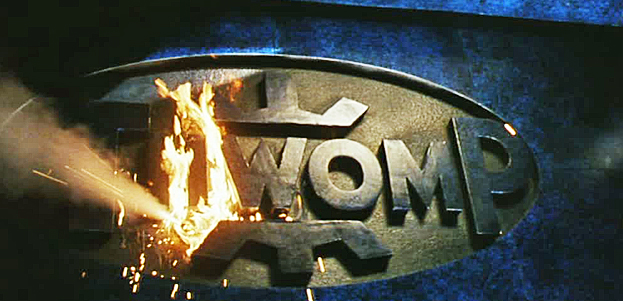
This really becomes a hard film to judge (if you've not yet seen it) because it's pretty flawless, in a technical sense. It had a superb cast, superb crew, an excellent concept and some of the best studio resources available to anybody at the time. However due to errors and mistakes made during production, regardless of who was to blame, forced the film into a soup of confusion. Is it this that makes Mario fans so angry? Possibly. But I think moreover they simply didn't like the idea of seeing their favourite games character ported into a different reality. This is a shame, because Super Mario Bros is not like other video game adaptions of it's era.
In the few years after the release of this movie came Street Fighter and Double Dragon. These films were made to be cheesy, designed with minimal effort and a generic crew and relatively poor casts to be a cheap and easy cash-in on a rising video game franchise. Super Mario Bros was not a quick and easy cash-in, it wasn't written on the back of a napkin and developed by a studio just after a fast buck. Disney had a lot to prove, having Tron as it's own pregenitor, and the effort to convert Super Mario with faithful nods to the games but respecting Shigeru Miyamoto's wish that it would be it's own unique entity really shows just how much attention this movie was given.
Even if deemed to be a failure by future generations (And this site's hope is for more gamers to become more aware of the film's positives to tackle this), hopefully the unfair and misplaced belief that this is the worst video game adaption, and that this was a cheap and thoughtless movie, can be debunked and replaced with an attitude that "Yeah, maybe it didn't work, but at least they gave it a good try worthy of note.".
Regardless of your perspective on the movie, the fact is it has become a huge cult movie. Many sci-fi movies do this, Alien and Blade Runner are two key examples of movies that were panned and avoided at release before being "rediscovered" on video to become huge success stories. Super Mario Bros is unlikely to hit the dizzy heights of those two cult movies, but then it does also have more obstacles to overcome. Trying to recover from a fanbase who pan the movie without actually seeing it, as well as becoming a key reference in video game and movie media websites as a core example of how not to make video game adaptions. Most of these people, including the industry journalists, haven't actually sat down and watched the movie, they simply reference it because it's the "cool" thing to do. The media who saw it on release had many positives to say on the movie, and the film's own fans certainly have much praise, despite acknowledging it's drawbacks.
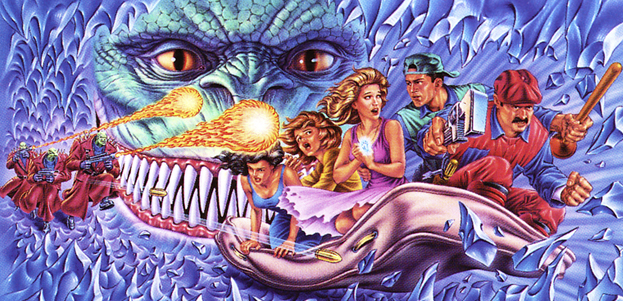
Ironically, the constant panning of this movie may be one of the reasons why modern video game adaptions also fail to make the grade. Despite its shortcomings, it was an honest and deep process to try and develop a genuinely fantastic film. When this was not acknowledged, but movies such as Dead or Alive and Resident Evil (Which had an interesting iteration prior to Anderson getting hold of the project) are considered quality enough to make money, how do you think a studio are going to adapt video games in future? Crude, half-naked ladies in rather poor action/fight sequences which makes them money? Or deep and interesting storylines with an attempt at hiring the top cast and crew to develop a genuine thought-provoking movie, which makes them no money and gets panned by the fans? A studio will go with what sells and doesn't get them moaned about. Because of this cultural faux-pas with the Super Mario Bros movie, decent video game films took a lot longer to get started and even now haven't reached the same quality as other non-video game based films.
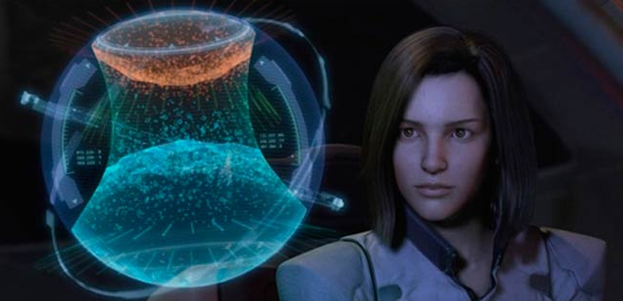
The Japanese film industry is also worth mentioning. While Hollywood are working on Video Game trailers and cheap, sexy translations to film, Japan are using state of the art CGI animation to create their own wave of movies based on video games. Other than Final Fantasy: The Spirits Within, all of these have been as accurate translations of the games as possible and the fans have been singing their praises for the releases of such films as Final Fantasy: Advent Children, Resident Evil: Degeneration and Tekken: Blood Vengeance. Ironically, none of these films is actually any good either. Past the graphical quality, Advent Children has a plothole suggesting it shouldn't have happened and is poorly written and directed (At least in the dramatic sequences), Resident Evil: Degeneration is too bland, far too long and generic to be worthy of note, and the less said about the length and stupidity of Tekken: Blood Vengeance the better. None of these films have anything that the Super Mario Bros doesn't, all of SMB's faults exist in these projects and often to a worse degree.
The Japanese live action film industry is hardly note-worthy either. Takashi Miike (Audition) is a famous Japanese director, who created a terrible below-average interpretation of SEGA's excellent Yakuza series. Despite this, fans hope that his Japanese origins will lead to his adaption of Phoenix Wright: Ace Attorney being the one golden light in video game adaptions. It won't be, if Yakuza is anything to go by. His direction sometimes (And definately did in Yakuza's case) lacks pace, drama and professional refinement. If he attacks Ace Attorney with the same eye as Yakuza then we have another poor and unfaithful film adaption by the Japanese.
Hollywood is learning to adapt to video game adaptions, to treat them a little more like comic books in distilling down the actual content of the games and keeping the feel and atmosphere the same. Silent Hill was a great video game adaption, which recieved many positive reviews, Tekken and Mortal Kombat Legacy have set down the ground work for dark and adult, but well made and superbly choreographed fighting game translations while Tom Clancy's Ghost Recon Alpha shows what a professional studio can do in shooting conversions using Ridley Scott's production team. It seems that while Hollywood is finally beginning to get the idea on how to convert video games into movies, Japan is struggling to actually write a decent script. It's ironic that Hollywood are so panned and Japan's studios so acclaimed, but perhaps that's because Hollywood dared to enter the genre first and made such a mess of it on their first attempt.
So you've read a basic run-down of the film's development, you've heard the great ideas and effort behind the film as well as the destructive direction and rewriting process. We've also mentioned here how it is not alone in not meeting expectations of the original games, and how many other game-based movies can hardly be considered highly superior to Super Mario Bros. Simply put, being the first of it's kind has made Super Mario Bros an icon. The success on theatrical release would lay down in history just what kind of icon it would be distinguished as - and unfortunately due to release date it failed to become a success. This film had everything going for it, and it is a fun and detailed movie. True, some of that quality requires some browsing into the film's history and the mystery of what was cut doesn't necessarily make the finished product amazing, however it does keep it intriguing (See the missing Dam level in Goldeneye 007 on the N64 for a gaming version of this). We love this movie because it has depth, it has high artistic merit in the surrounding design and putting all that aside it is a thoroughly enjoyable film to watch.
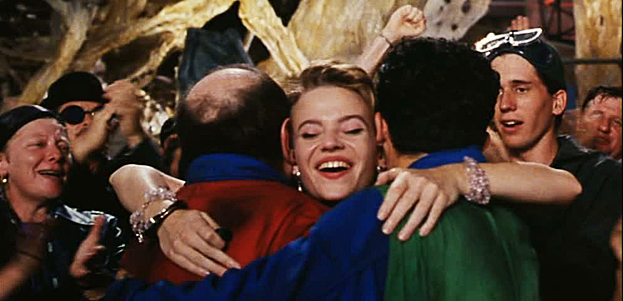
Fan complaints generally devolve into tiny and unimportant details, and many videos and text reviews get key parts of the film wrong. Luigi has no moustache, Bob Hoskins is British, Koopa isn't a dinosaur at the start, why is it a sci-fi, etc etc. The list is often a long list of minor and childish stabs at the movie because those writing about the film don't actually watch it and/or know much about it. If there is to be any complaints lobbied at the movie, it would be the quality of the script (Due to constant rewrites) and the chopping of darker sequences to try and be more "family-friendly". These are rarely, if ever, raised points when speaking negatively on the film.
The main point of the film is to be a unique, stand-alone origin story for the Mario Brothers. How they came to become heroes of a world despite starting off as humble plumbers. Their costumes are not the Mario Bros' outfits until the end (Or at least a very good filmatic adaption, dungarees wouldn't have worked), nor are they the heroes they are meant to be until that point. Fans and critics should really try the film again with a more open viewpoint on seeing the film as an honest attempt at a cinematic translation following the themes of Mario Bros, rather than a direct translation of the original games (Which, as stated before, would have been against Shigeru Miyamoto's wishes).
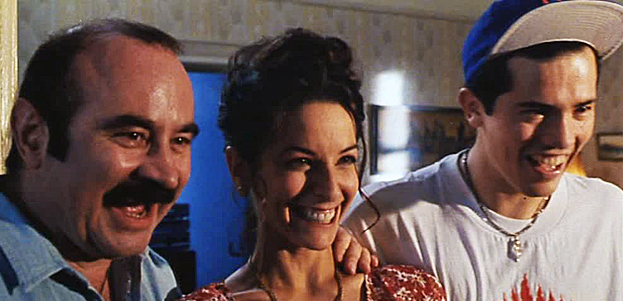
There is clearly something in this film that grabs us. For some it is the fact that it is a nostalgia trip from seeing at as kids. For others who have only discovered it recently it is down to the fun adventure the film has to offer. For me, personally, I am intrigued by the depth and detail put into such a different adaption of an iconic game series. As a fan of both gaming and science fiction, I am fascinated by how they managed to merge the two genres as well as blend the fantasy and science fiction elements. I am disappointed that the script didn't stay a bit darker, and keep some more of the thought-provoking socio-political elements the original script had to offer, but the strange thing is much of these storylines are at least hinted at in the background and prop designs. It was an incredible feat to achieve, the Tron of the 1990s which unfortunately got marred by so many production problems that the final product never managed to gel all the unique ideas it had together as a whole piece. Regardless of this failure to the original script, it remains a brilliantly fun adventure romp and cheesy enough to entertain. It could have been far worse, and there's still a chance for a re-edit to make it slightly better. As a piece of video game/movie history, becoming a cult classic and managing to merge so many different elements - the Super Mario Bros Movie deserves higher praise than it currently recieves and better release treatment by the studios that hold the rights and initial filmreels.
-Rory "Roareye" F. Joscelyne
